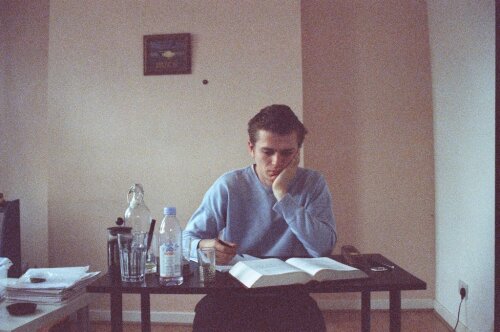Dwelling in Twentieth Century French and German Jewish Philosophy

Thomas Froy’s research is concerned with the notion of dwelling. Focusing on three essential questions – why does dwelling remain necessary?; what is the experience of dwelling?, and what is the space of dwelling? – he reads the work of Emmanuel Levinas, Jacques Derrida and Martin Buber in order to understand what it means to dwell today.
Since at least early modernity, the places we call home have become less secure and stable. Where once we might think of our place of birth as an original, fundamental part of our identity, the security and stability of those places has been radically called into question. Be it the ambiguous ‘liberation from place’ provided by new technologies which allow us to connect over great distances or the various forms of violence which force people from their homes, when we think about what it means, today, to be at home, it is difficult to think of simple, safe, security.
Should we dispense entirely with the notion of dwelling? If we no longer dwell in a particular place, but – by will or by force – move from place to place, connecting with others, can we really say that we still dwell? If we dwell, do we still have a sense of community such that our dwelling place is ‘our own’? Is there nothing left – nowhere, no place, no time – for dwelling?
Emmanuel Levinas provides an emphatic answer those who might consider dwelling unnecessary or obsolete: dwelling remains absolutely necessary, because dwelling provides refuge. Levinas’ work certainly recognizes, in today’s world, the impossibility of a safe and secure home; yet it is precisely the dangers of an unstable and insecure world which necessitate dwelling and the provision of refuge or shelter. It is precisely because those places which once provided safety and security have had their very existence called into question that dwelling remains necessary insofar as it can provide refuge or shelter.
Jacques Derrida’s retheorization of dwelling as hospitality contributes a forceful reorientation of the debate on dwelling: his late work confronts the reader with a radical formulation – dwelling without hospitality is not dwelling at all. Dwelling, for Derrida, need not recover lost traditions or cultivate practices of tolerance: instead, we must understand dwelling as a fundamental experience – the experience of giving and receiving hospitality.
In the work of Martin Buber, we find a theorization of the space of dwelling which, in some regards, is tremendously anachronistic with regard to today’s dwelling places. Insofar as Buber thinks of dwelling as a place of rootedness and origin, his work is inaccessibly distant for today’s dwellers; to the extent, however, that Buber thinks of space rootedness and origin as a means for collaboration – with relatives, friends, neighbours, strangers, even enemies – his work presents the contemporary reader with a certain necessary optimism. For Buber, we may be far apart, but thus we have the space to collaborate on something larger than each of us.
Rereading the works of these essential thinkers can help us to understand what it means to dwell today, and to think what it might mean to dwell tomorrow.
Thomas Froy wrote his Bachelor thesis, under the supervision of Alexander Bird at King’s College, London, on Jacques Derrida’s critical confrontation with the early work of Michel Foucault. At stake in this confrontation is the limit of philosophical domain, and the relation between Reason and subjectivity. His Master thesis, written at Katholieke Universiteit Leuven under the co-supervision of Julia Jansen and Liesbeth Schoonheim, examined the contemporary intersection between queer theory, feminist theory and critical disability studies, especially concerning the notions of ‘vulnerability’ and ‘community’. In the course of the Inter-University Research Master in Philosophy, Thomas focused on the relation between ‘action’ and ‘preservation’ in the work of Derrida, Foucault and Martin Heidegger. His research at the University of Antwerp (Institute of Jewish Studies and Centre for European Philosophy) will examine the notion of dwelling in twentieth century French and German Jewish Philosophy, with a particular focus on the work of Derrida, Emmanuel Levinas and Martin Buber.
He has presented his work at numerous academic conferences and published his work in a number of peer-reviewed journals.